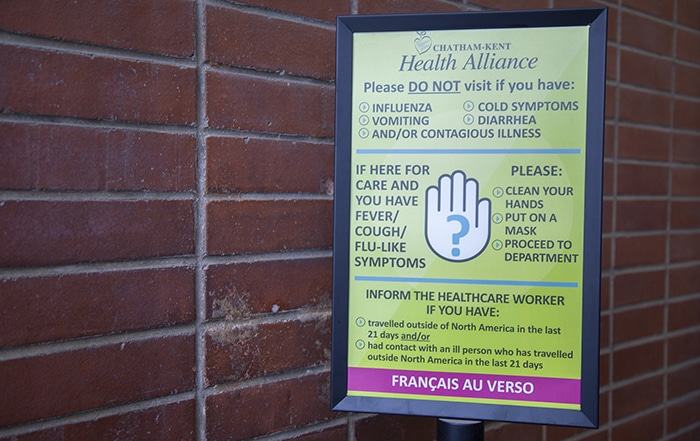
With two confirmed cases of the coronavirus reported in Ontario as of Monday, Chatham-Kent Health Alliance (CKHA) officials say they are prepared for the worst.
The coronavirus, which first surfaced in China and has killed more than 106 people as of Tuesday morning, and afflicted at least 4,600 others, surfaced in Toronto on the weekend. A man who recently returned from Wuhan, China, the epicentre of the global outbreak was in hospital in Toronto. His wife also has shown symptoms of the virus.
Here in Chatham-Kent, Lori Marshall, president and CEO of the CKHA, said the alliance has worked closely with Public Health to prepare.
“This is very different than when SARS hit (in 2003). Public Health and health-care workers understand these infectious diseases much better now than we did back then,” she said.
A key element is protecting health-care staff from possible infection, she said. In China, hundreds of hospital staff have come down with coronavirus after exposure to patients.
“We don’t send a firefighter into a burning building without their protective equipment. It’s also important for hospital staff and physicians when caring for someone who may have an infectious disease that they wear proper protective equipment and they do the proper screening,” Marshall said.
She added hospital staff at the registration desk ask whether someone has been traveling recently, and if so, where to. They also look for the signs and symptoms of coronavirus.
Those present very similar to influenza, such as runny nose, headache, cough, sore throat, fever and a general feeling of being unwell, according to the federal government’s public health website.
Hand sanitizer and masks are available at the hospital entrance as well, Marshall said.
Should anyone appear to have coronavirus, she said they would be admitted into a part of the hospital where there is “negative pressure” so that anything potentially airborne due to coughing or sneezing is not able to escape the area through simple airflow; the area has a lower air pressure than nearby hallways.
It sucks in air rather than expels it.
“It contains anything someone might be coughing out,” Marshall said. “Our facilities are much better than they were a number of years ago. Our staff and physicians are well aware of the precautions they have to take.”
Marshall would not comment on the risk level in Chatham-Kent, but added she is well aware there is the potential for coronavirus to reach our part of the province.
“We are in a global economy. I believe there are probably individuals in Chatham-Kent who have travelled and likely people who come into Chatham-Kent who have travelled,” she said.
Marshall suggests people continue to do what they do to help prevent the spread of colds and flu: wash your hands often, avoid being in contact with people who are sick, and practice proper coughing and sneezing techniques into your bent elbow.






